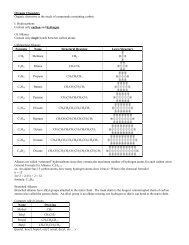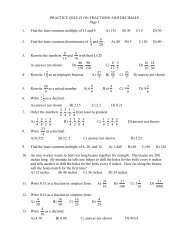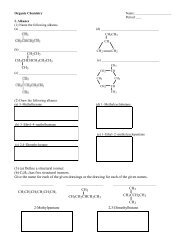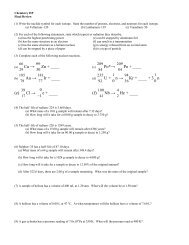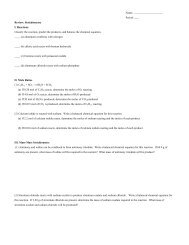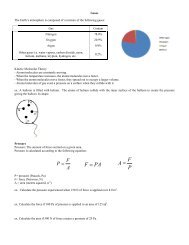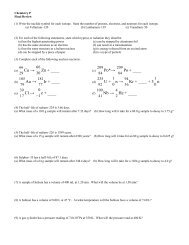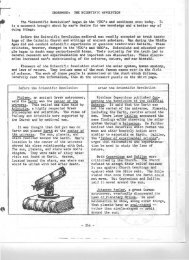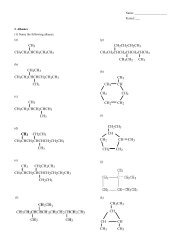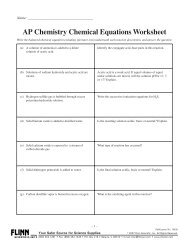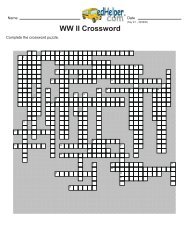- Anyhow, Jackson was reelected easily [random note: this election first in nation’s history where candidateschosen by conventions] and quickly proceeded to take down the bank in 1833. Here’s what he did…*Jackson’s Second Term: Financial Crisis*- Basically, Jackson began by taking the $ in the nat’l bank and putting it in state-chartered banks – therebyshrinking the bank and making it just another private bank after 1836.- Then came the Deposit Act of 1836, which allowed the Secretary of the Treasury to choose one bank perstate to do what the SBUS used to. The act also provided that any federal surplus over $5 million be given tothe states starting in 1837. The surplus [from speculation in public lands] was then put into bank notes bystate banks. This worried Jackson, who hated paper $, so…- He convinced Secretary of the Treasury Levi Woodbury to issue the Specie Circular, which said thatafter August 1836 only gold/silver could be used to pay for land. This reduced sales of public land and killedthe surplus and the loans to the states.- This policy was a total disaster. This economy stuff is confusing, but the idea is that e/t there were fewerland sales and less land, people continued to speculate. The increased demand pressured banks, whichdidn’t have enough specie, and credit contracted – fewer notes issued, fewer loans made.- Jackson just made things worse by continuing his hard $ policies, and his opponents had a field day.Congress then voted to repeal the circular, but Jackson pocket-vetoed this and the policy stood until in mid1838 a joint resolution of Congress killed it.- Jackson was the first President to really use his veto powers, which was another reason why he wasattacked as being “King Andrew.”*The Second Party System*- In the 1830s, opponents of the Democrats, many of who were left over from the old National RepublicanParty, joined together in the Whig Party. The Whigs resented Jackson’s power over Congress, and<strong>com</strong>peted on a nat’l level w/the Democrats from 1834 through the 1840s.- The Whig/Democrat thing became known as the Second Party System, and was more organized andintense than the first DR/Federalist one.- As the years passed the differences between the Whigs and Democrats became clearer… The Whigs favored an economy helped by an active central gov’t, corporations, a nat’l bank,and paper currency. They also supported reform – they were generally more enterprising andoptimistic than the Democrats were. Whigs supporters were generally evangelical Protestants,Methodists, or Baptists – and were usually <strong>Am</strong>erican-born or free black.The Democrats favored limited central gov’t and were afraid of concentrated power. Democratsupporters were generally foreign-born Catholics, or non-evangelical Protestants.- When the Presidential Election of 1836 came about, however, the Whigs had not yet be<strong>com</strong>e a nat’lparty, so they entered three sectional candidates [Webster, White, Harrison] against the Democrats’ MartinVan Buren, who won easily.- But, a few weeks after VB took office the whole <strong>Am</strong>erican credit system collapsed, setting off an economicdepression that persisted from 1839 to 1843. VB didn’t help by continuing Jackson’s hard $ policies andestablishing a new regional treasury system for gov’t deposits (1840).- Then in the Presidential Election of 1840 the Whigs, now nationally organized, used the economic crisisto attack the Democrats and promote their candidate, William Henry Harrison and his running mate JohnTyler [“Tippecanoe and Tyler Too”].- Harrison’s grassroots campaigning strategies worked, and he beat Van Buren – which didn’t do him muchgood, since he died of pneumonia a month after his inauguration. Tyler, a former Democrat who left theparty to protest Jackson’s policies over nullification, really wasn’t a Whig at all, and promptly began vetoingthe entire Whig program.- The only thing that did get passed during Tyler’s administration was the repeal of the independent treasurysystem and a higher tariff. Oh yeah, and the entire cabinet resigned, leaving Tyler a president w/o a Party[Whigs called him “<strong>His</strong> Accidency”].*Manifest Destiny and Expansionism*- Expansionist fervor only increased through the 1830s and 1840s and soon became a part of politics. Themid 1840s saw the rise of the whole manifest destiny idea, which was spurred by nat’l pride esp. after thedepression ended in 1843, by racism [“we can use the land better than Native <strong>Am</strong>ericans can”] and by adesire to eliminate perceived external threats to nat’l security.- The big goals for expansionists were…32
TEXAS (Southerners) – Texas had been settled by <strong>Am</strong>ericans since 1821, when Mexicobecame independent and opened the area to all. By 1835, the settlers were numerous,powerful, and tended to ignore the Mexican gov’t, causing dictator Santa Anna to tightencontrol. This sparked a rebellion, which culminated in Texan independence and theestablishment of the Lone Star Republic in 1836. Texas opened annexation negotiationsw/Washington and Tyler, eager to gain the 1844 Democratic nomination, pushed for it. TheSenate, however, rejected it – Northerners and Whigs didn’t like the idea.OREGON (Northerners) – Oregon had been split between the US and Britain since theConvention of 1818, but when “Oregon Fever” broke loose in 1841 fervid expansionists begandemanding the entire area for the US [“Fifty-four forty or fight”].- Naturally, expansion into Oregon and the rejection of Texas worried Southern leaders, who responded byconvincing the 1844 Democratic convention to use a new rule – if candidate not chose by 2/3 of conventionhe’s out. This blocked Van Buren as the nominee and led to the selection of James K. Polk [hard moneyJacksonian, expansionist, slaveholder].- So in the Presidential Election of 1844 Polk ran against Henry Clay [Whigs] and James Birney [LibertyParty, took votes from Clay] and beat them both.- Right before leaving office, though, Tyler got Texas admitted into the Union [December 1845] through ajoint resolution of Congress [requires only simple majority while treaty needs 2/3].The Road to Civil War (1845 – 1861)*The Mexican War*- In the 1844 election, expansionist Polk [Democratic] was elected. Polk quickly set about ac<strong>com</strong>plishing histerritorial goals – starting by provoking a war w/Mexico (right before his inauguration the US had annexedTexas) by urging the Texans to seize all the land to the Rio Grande.- When Mexico argued about the border, Polk sent troops under General Zachary Taylor [“Old Rough andReady”] to Rio Grande in 1846. Since he really wanted CA, he tried to buy it as a last resort. When that fellthrough, he simply waited for war to erupt.- On April 24, 1846 Mexican cavalry finally responded to the US invasion and the war began [it was votedfor by Congress on May 13]. This excited people, and there were many volunteers due to a craving foradventure, racist tendencies, and general expansionist dreams [still, some abolitionists were mad, and evenCalhoun got worried that the war could lead to problems down the road].- The war in short: Colonel Stephen Kearny invaded New Mexico and CA [where he was helped byrebellious settlers under Captain John C. Frémont], General Zachary Taylor secured northeastern Mexicoand General Winfield Scott went all the way to Mexico City and captured it.- The result was the Treaty of Guadalupe Hidalgo (signed in February 1848) which got the US California,New Mexico, Nevada, Utah, Arizona and the RG Texas border and got Mexico a very pathetic reparationspayment of $15 million.- As far as Oregon went, though, Polk had to throw out his campaign slogan and instead diplomatically [hedidn’t want to be fighting two wars at once] pressure the British for a split along the 49th parallel, which wasagreed to in 1846.*Reactions to Territorial Gain*- Not everyone was obsessed w/gaining territory from Mexico – in fact, New Englanders, abolitionists and afew antislavery Whigs saw the whole deal as a plot to extend slavery, which didn’t go over too well.- This was part of the whole Northern fear of a “Slave Power Conspiracy” – i.e. that a slave-holdingSouthern oligarchy was taking over all political and economic power in the nation. So, not surprisingly, theNortherners weren’t so hot on gaining territory if it was going to be slave territory.- In the South overall opinion was pretty much in favor [although ultra-racists like Calhoun worried that takingtoo much Mexican land might bring too many Mexicans into the US, which they saw as bad].- Slavery’s overriding importance in the Mexican war issue was confirmed in August 1846 w/the WilmotProviso – a proposed amendment that made slavery illegal in any territories taken from Mexico. Wilmotwasn’t really an abolitionist – it was more self-interest b/c her worried the spread of slavery would hurt laborby free whites and deny them their rights to work [also anti-Slave Power].- The Wilmot Proviso majorly untied the South in support of the Mexican war, even more than at thebeginning. Calhoun led their new position, which was that the territories belonged to all the states and thatthe gov’t was therefore powerless to stop slavery’s spread there [Fifth <strong>Am</strong>endment right to take propertyanywhere] – this was the state sovereignty position.*The Election of 1848*33
- Page 3 and 4: Congregationalists (Puritans) - The
- Page 5 and 6: - So the Restoration Colonies, form
- Page 7 and 8: - So in England, where they were lo
- Page 9 and 10: *Colonial Politics 1700-1750: Relat
- Page 11 and 12: - Another ideology that was beginni
- Page 13 and 14: - The Quebec Acts were passed aroun
- Page 15 and 16: - So, by 1782, what had seemed to b
- Page 17 and 18: on the economic side, since the gov
- Page 19 and 20: - Anyway, Congress had several ques
- Page 21 and 22: - Adams was still in the early Wash
- Page 23 and 24: *Political Factionalism and Jeffers
- Page 25 and 26: - Samuel Slater set up the first te
- Page 27 and 28: - Court rulings extended the powers
- Page 29 and 30: Revival, Reform and Politics during
- Page 31: - Anyhow, during his administration
- Page 35 and 36: - Anyhow, Pierce’s total support
- Page 37 and 38: They had a smaller everything: smal
- Page 39 and 40: - The two Northern victories at the
- Page 41 and 42: - The result was the Fourteenth Ame
- Page 43 and 44: The Slaughter-House Cases (1873) -
- Page 45 and 46: in the arrest of 8 immigrant radica
- Page 47 and 48: case (1897 - ICC can’t set rates)
- Page 49 and 50: - The Populists prepared to run aga
- Page 51 and 52: - MOST IMPORTANTLY, though, was the
- Page 53 and 54: - So, what led the US to undertake
- Page 55 and 56: - The rebellion, led by Emilio Agui
- Page 57 and 58: - Still, Americans managed to turn
- Page 59 and 60: - So - the point of this episode? B
- Page 62 and 63: *Hoover’s Response*- Poor Herbert
- Page 64 and 65: - In FDR’s second term, however,
- Page 66 and 67: Dominican Republic - When we left i
- Page 68 and 69: World War II (1941 - 1945)*The Cour
- Page 70 and 71: - So Truman started off again all c
- Page 72 and 73: - First of all, the 1950s were (for
- Page 74 and 75: peace w/Japan that ended occupation
- Page 76: - France wanted out, so at the Gene



